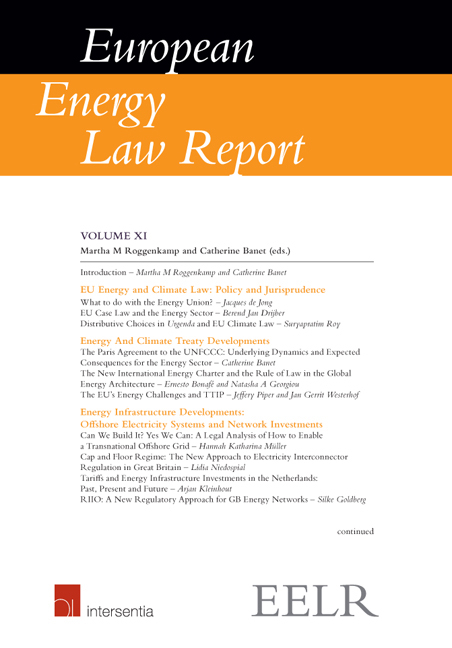Book contents
- Frontmatter
- Editorial
- Contents
- List of Abbreviations
- List of Contributors
- Introduction
- Part I EU Energy and Climate Law: Policy and Jurisprudence
- Chapter I What to do with the Energy Union?
- Chapter II EU Case Law and the Energy Sector
- Chapter III Distributive Choices in Urgenda and EU Climate Law
- Part II Energy and Climate Treaty Developments
- Part III Energy Infrastructure Developments: Offshore Electricity Systems and Network Investments
- Part IV Heat Supply Legislation in the Eu
- Part V Security of Energy Supply and Safety
Chapter III - Distributive Choices in Urgenda and EU Climate Law
from Part I - EU Energy and Climate Law: Policy and Jurisprudence
Published online by Cambridge University Press: 29 September 2018
- Frontmatter
- Editorial
- Contents
- List of Abbreviations
- List of Contributors
- Introduction
- Part I EU Energy and Climate Law: Policy and Jurisprudence
- Chapter I What to do with the Energy Union?
- Chapter II EU Case Law and the Energy Sector
- Chapter III Distributive Choices in Urgenda and EU Climate Law
- Part II Energy and Climate Treaty Developments
- Part III Energy Infrastructure Developments: Offshore Electricity Systems and Network Investments
- Part IV Heat Supply Legislation in the Eu
- Part V Security of Energy Supply and Safety
Summary
INTRODUCTION
Sometimes a case comes along that has repercussions beyond the parties to the dispute and the specific legal questions under consideration. It not only has the potential to be crystallized as a precedent with respect to the subject matter in the State where it is filed, but has ramifications for other areas of law and other legal systems. It becomes a ‘judicial decision that has normative implications beyond the context of a particular case’. The Urgenda decision 2 of the Rechtbank Den Haag (the Hague District Court) published on 24 June 2015 is one such decision.
The case was raised by a group of private petitioners represented by the Urgenda Foundation, a non-governmental organization (NGO), arguing that the State's climate mitigation measures are not significant enough to protect the citizens of the Netherlands from the impending threat of global warming (hereinafter the judgment is referred to as ‘Urgenda’). The State, therefore, did not satisfy its duty of care towards its citizens. In its decision, the Court agreed with Urgenda that the State is required to take more action to combat climate change.
The decision has had widespread consequences. It has already assumed importance not only in the Dutch legal system, but has also prompted climate change lawsuits in other jurisdictions. The decision has grabbed the attention of the media, and celebrities have endorsed the call for more climate action. Legal scholars also seem to be substantially interested in it, and there has been an outpouring of literature on the case. Most of this literature indicates, however, that the decision is situated on shaky legal grounds. The impact and value may be toppled if the State of the Netherlands succeeds in an appeal it has lodged against the decision in the Court of Appeals. To my mind, irrespective of the outcome of the appeal, the decision is already firmly etched in the history of climate law. This is so for reasons I have detailed in two earlier articles. In the first article, I show how ‘diffused’ jurisprudence from other jurisdictions combined with Dutch jurisprudence to allow the Court to take cognizance of a private climate change lawsuit and handle the thorny issue of judicial overreach in the bargain.
- Type
- Chapter
- Information
- European Energy Law Report XI , pp. 47 - 68Publisher: IntersentiaPrint publication year: 2017
- 2
- Cited by

